#bluebeards egg
Explore tagged Tumblr posts
Quote
In the spring, at the end of the day, you should smell like dirt.
Margaret Atwood, Bluebeard's Egg
129 notes
·
View notes
Text
Working on some early ideas for a Bluebeard retelling, so here’s some concept art (subject to change) Lucretia our Heroine
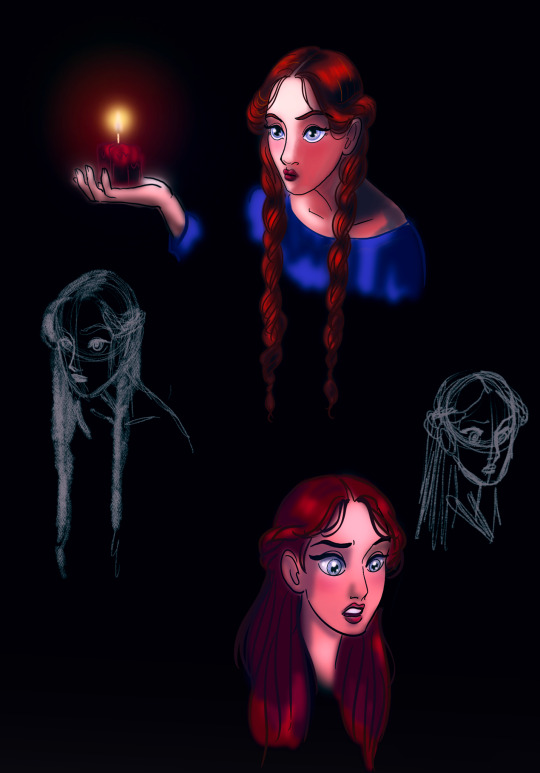
And Bluebeard our Villain
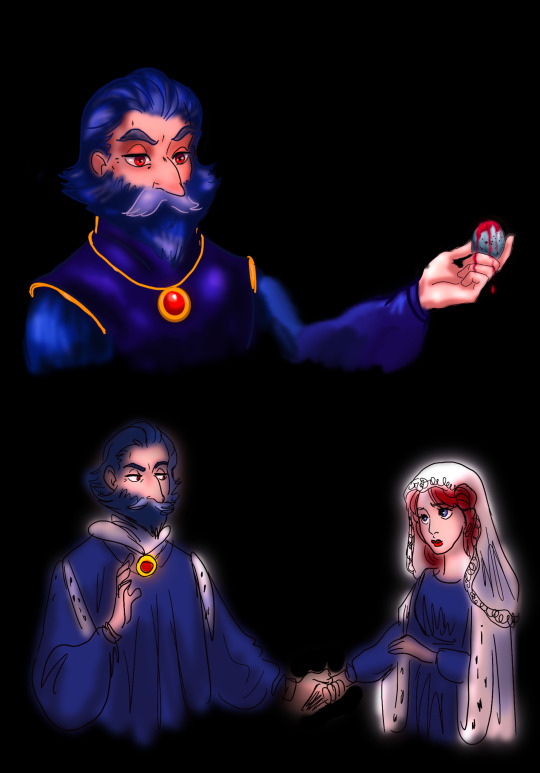
I’m basing their looks/names/time period off of what I could find from what Disney already had Bluebeard wise. Which was a tombstone with the names of Bluebeard’s previous wives and their/his date of death and a portrait of Bluebeard in Jake and the Neverland Pirates 😅

Plus some 1440s historical inspo. But yeah we’ll see how this goes!
#my art#disney#bluebeard#concept art#DisneyVerse#my OCs#Disney ocs#fairytale retellings#jake and the neverland pirates#good grief would not have expected Bluebeard Disney lore from that show xD#but could def make the egg that gets bloody (taken from the Fitchers Bird version) an egg from his bluebird familiar#there’s already a story idea I have of. why he’s killing all these girls#definitely gotta Fitcher Bird put them back together and come alive again after in this hypocritical Disney version#Disney Movie Concepts
90 notes
·
View notes
Text
'Sinkhole' and 'quagmire' are not flattering ways of speaking about other women, but this was at the back of Sally's mind.
Bluebeard's Egg by Margaret Atwood
3 notes
·
View notes
Text

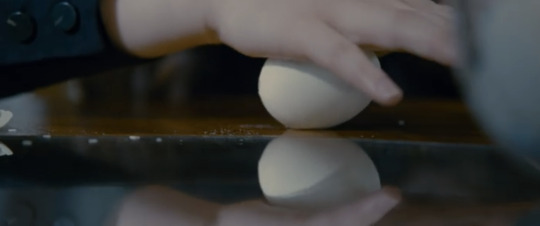

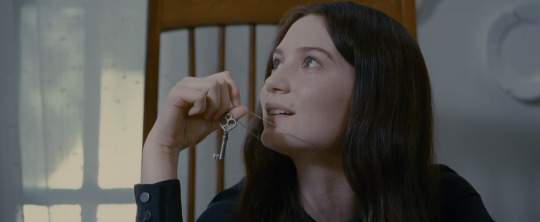
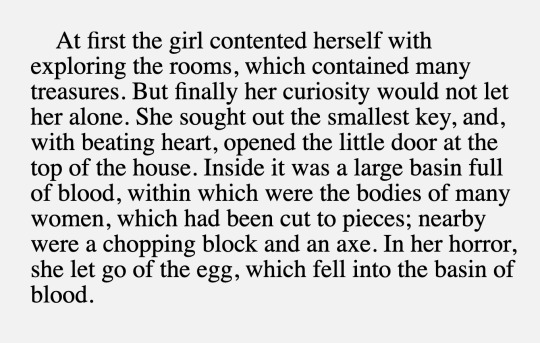





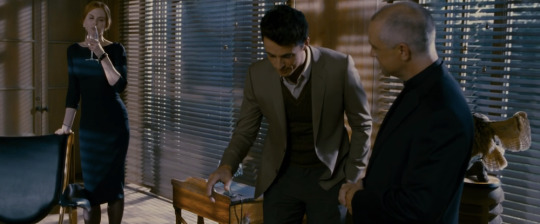


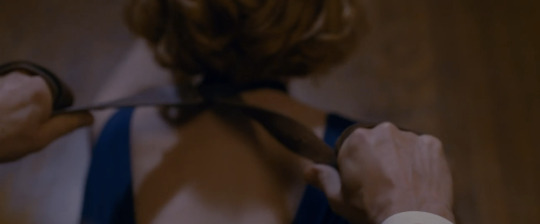





Margaret Atwood, “Bluebeard’s Egg”
Stoker (2013) dir. Park Chan-wook
#stoker#margaret atwood#stoker 2013#fairy tales#bluebeard#park chan wook#comparatives#stokerposting today…..#*#film
64 notes
·
View notes
Note
One of my favourite things about Bluebeard is Draco’s unprocessed grief for his parents. Him imagining his parents having tea in a different room of the Australian mansion and pretending they’re sat behind him at Christmas js hits me in the feels, and also leads me to ask how would Draco process it eventually? How long would it take him? Has he come to terms with it by the time of The Diadem?
His unprocessed grief was definitely one of the things that stood out to me once I switched to Draco POV for Bluebeard and got into his head. It's a uniquely difficult experience for him. No one in the world has experienced what he has, and he can't confide in anyone other than Tom, lest he be thought insane or risk causing some sort of time paradox (at least... a bigger one than he already caused by spilling the beans to voldemort). He can't even be vague about 'a death in the family' or whatever because he isn't exactly mourning their deaths... since they will likely still be born in the future. It's the loss of the people that they were to him, closer to mourning a parent with dementia, I suppose.
And on top of that, Tom is about the least sympathetic ear possible, since he is quite confident that dead parents is ideal. If Draco's parents weren't dead/pre-birth, he'd prob suggest offing them anyway. That murdering his father did, in fact, not cure his deep seated resentment and abandonment issues is another matter.
I would say that grief comes out predominately when Draco isn't as close with Tom. As Tom is the only one who actually knows his past—and is, even unintentionally, the kind of person who elicits intense personal connection by nature of his personality—Draco develops a real emotional dependency on him to meet his needs for friendship, family and romantic love. All of his eggs are in one basket, so to speak, which is why the loneliness, guilt and misery in Bluebeard Chapter 3 hits him far harder than it would have if he'd still had his support network in place. To not have a single person in the world who has his best interests at heart is a foreign experience to Draco and very upsetting. It's also yet another thing that Tom can't understand as he has never had a support network. The contrast between the effects of similar traumas experienced at critically different ages is a whole other topic though.
Draco is an excellent compartmentaliser—arguably to his own detriment—so rather than process his grief, he shoves it down and ignores it, bar those occasions when his isolation is impossible to ignore. I think if Tom does leave England, even briefly, Draco will struggle to continue ignoring reality. He's the sort of person who uses social stimulus to numb negative emotions.
Lucius and Narcissa being born in this world will likely be the kind of comfort and closure he needs. He'd still miss them but it wouldn't be as severe. Now, if he's fucked up the timeline to the degree that his parents aren't born... that's when he'll actually have to come to terms with their deaths. Deaths caused by him.
20 notes
·
View notes
Text
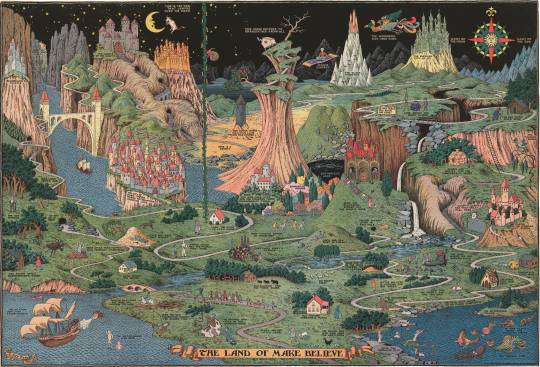
I was recently reminded of the existence of this artwork, so I'll make a quick post about it. I had a very large version of the picture allowing t scrutinize little details - but unfortunately the size limit of Tumblr shrunk the picture.
This is the map known as "The Land of Make Believe", the most famous work of Jaro Hess - a collection of more than sixty references to various fairy tales, nursery rhymes, pieces of children literature and European legends, collected together in the shape of one fantastical and magical land. It was published in the early 1930s.
I will leave under the cut a complete list of all the places described and named on this map (a bit more than sixty in total):
Here the North Wind lives
Bluebeard's Castle
Here lives Peter Pan
Rip Van Winkle
Do not go in here
Here Little Miss Muffett was terribly frightened
Red Riding Hood's Grandmother's house
Jack Sprat - His house
The dilatory ship that never comes in
The Water Babies live here
Here the old man caught the golden fish
Dapple Gray Poney she rode him through the mire
Little Boy Blue fast asleep
The city of many towers where the beautiful princess lives
The castle of the giants
This is the cow that jumped over the moon
The city of brass
Jack the giant killer's house
Simple Simon met the Pieman here
Goldilocks and the Three Bears
The Pied Piper of Hamelin
The Crooked Man lives in his Crooked House
Mary and her Little Lamb
The black hen who laid eggs for gentlemen
Old Mother Hubbard's place
Bo-Peep's sheep
Contrary Mary's garden
Jack and Jill went up this hill
Here fairies dance in the moonlight
Here the Old King Col lives and the fiddlers three occasionally fiddle
Enchanted woods
Bottomless lake
Here is a desert
High tower where the little lame prince was locked
This house belongs to Grandfather-know-all
Magic carpet
The glass mountain
The wonderful Moo-Moo bird
The Emerald City of Oz
Long, Broad and Swift Glance
Do not walk near the edge!
Hansel and Gretel find the gingerbread house
Here the black bird picked off the maid's nose
Peter Rabbit lives in this hole
Here are the Babes in the Woods, covered in leaves
The shoe here the old woman lives
Little Bo Peep is looking for her sheep
The Wandering Jew
Tom-Tom the piper's son ran this way
Here the mermaids play
The Squall Fish
In this place there are peculiar fishes
The mysterious island
The path that leaves to no place eventually
The house that Jack built
Cinderella lives here
The castle where the Sleeping Beauty sleeps
Humpty Dumpty had that great fall here
The talking bird
The old witch lives here
West of the moon
East of the sun
#the land of make believe#fantasy map#fairytale map#art#jaro hess#fairytale crossover#nursery rhymes#fairytales#children literature#fairytale land
81 notes
·
View notes
Note
I'm only semi-familiar with the Blue Beard tale, so I'm very curious if this is a hint of things to come in the next chapter or if there is a larger significance I'm missing that John gravitated to that tale and comparing Arthur to the wife.
alright, i can tell already that this is going to be a long answer, so i'm gonna put it under a cut because i can't be regular about bluebeard.
so the original bluebeard story is slightly different from the one that i had john reference in the blind leading. the original is a french folktale about a wealthy and secretive nobleman, who has had six wives that all mysteriously vanished. he throws a massive party, at which the youngest daughter of bluebeard's neighbor decides she'll agree to be his seventh wife.
for a while after they marry, everything proceeds as it should. then bluebeard has to go on a long trip out of country. he gives his wife a ring of keys to his estate, telling her she can go anywhere but one room-- and if he catches her unlocking that door, there will be hell to pay.
of course, curiosity overtakes her eventually and she has to look. when she does, she discovers a blood-soaked room with the corpses of bluebeard's six previous wives chained to the ceiling. she drops the keys in her horror, getting blood on the key to the forbidden room, which throws her husband into a blind rage when he returns home and discovers it. he threatens to kill his wife on the spot, but she prays for her sister and brothers to save her from her murderous husband, and they do.
this folktale is often cited as a cautionary story against women's curiosity. later retellings have more sympathy for bluebeard's wife and allow her to escape by her own cunning, shifting the moral to be more about trusting your intuition.
the version i like most is "fitcher's bird", the grimms' fairy tale that makes bluebeard (a wizard this time) target three sisters as his dead wives to be-- he marries them oldest to youngest, moving on to the next after he murders his current wife. this is the bit that john fixates on in the blind leading, the way that the youngest daughter watches bluebeard do his grisly work and is not taken in by his charisma or the dark twisted way he mesmerizes everyone. eventually the youngest daughter marries him anyway, just to find out what happened to her sisters, and this time is given an egg to look after while her husband is away on business. he tells her not to unlock his one secret room.
what she doesn't know is that he played this trick on both her sisters, who failed the test by dropping their eggs on the floor when they open the forbidden room. the blood from the murdered women he's keeping in there stains the white shell, letting bluebeard know where they've been and what they've seen when he returns home.
the youngest (cleverer or perhaps just more paranoid than her sisters) keeps her egg locked away in her bedroom for safekeeping, and thus does not drop it in surprise when she comes across the gore splattered around her sisters' dismembered bodies.
the rest of the story is her outwitting her husband and stealing back her sisters' bodies, which, through careful re-assembly, have come back to life. now having bested bluebeard, the three of them are safe to tell everyone they know what happened to them and get their revenge on bluebeard by burning him alive in his own home.
in the blind leading, obviously the king in yellow is bluebeard. he's a murderous entity who chews up his human toys, and makes arthur jump through hoops and mind games just for love of the sport. john draws the parallel himself; arthur is the same kind of curious and paranoid as bluebeard's final wife, and just as willing to open a forbidden door, knowing full well that whatever he discovers behind it could drive him mad. john loves this about him. bluebeard's wife has a trait that john admires more than anything else: resilience. she leaps headlong into horror and has some ineffable quality that allows her to survive it, where everyone else must die. by calling arthur bluebeard's wife, john is telling him he thinks he's brave and more stubborn than the devil himself, and capable of outlasting unimaginable horrors. as john says later that chapter:
“It’s the youngest that’s the smart one. She sees through him immediately, and only marries him to find out what he’s done with her sisters. She opens locks in his labyrinthine house with keys she shouldn’t have, she sees the truth of her blood-thirsting husband, and she throws herself into the horror and fear and betrayal to reach the bottom of the mystery. She has to know, you see. It doesn’t matter that she’ll loathe whatever she finds. [...] You would survive Bluebeard. You would outlast and outsmart the cannibal husband. You would sit at his table and smell the gore on his breath and best him.” (chapter 2)
john, to no surprise, secretly sees himself as bluebeard too. subconsciously, he feels he's tricked arthur into "marrying" him somehow, snake-charmed him into becoming whatever it is they're becoming. and he feels all the shame and guilt and fear about that that you'd imagine. but nevertheless, he's charmed by arthur's cockroach-like ability to not die in the face of extreme adversity, and he simply must tell him this, even if in the most fucked up way possible :)
#sorry for the bluebeard essay do you still think im hot#nathaniel.txt#replies#kananeski#the blind leading#bluebeard#whoag.
10 notes
·
View notes
Text
"... the air was heavy with things that were known but not spoken."
Margaret Atwood, Bluebeard's Egg; from 'Significant Moments in the Life of My Mother'
5 notes
·
View notes
Text
Books read in 2024:
Todos deberíamos ser feministas - Chimamanda Ngozi Adichie
Us - Sara Soler
The prince and the dressmaker - Jen Wang
Sirius - Ana C. Sánchez
Guia gramatical de llenguatge no binari
La vida secreta de los bots y otros relatos - Varios autores
Camp Damascus - Chuck Tingle
Insólitas - Varias autoras
Parlo tres llengües, escric en dues, somio en una - Kamala Das
Heartsong - TJ Klune
Bluebeard's egg and other stories - Margaret Atwood
The beginning place - Ursula K. Le Guin
A troll's tale - Janette Backman
A midsummer's night dream (manga version) - William Shakespeare
Wandering son - Shimura Takata
The Hollow Ones - Chuck Hogan & Guillermo del Toro
The quantum thief - Hannu Rajaniemi
Dear Evan Hansen: The Novel - V. Emmich, B. Pasek, S. Levenson, J. Paul
The core of the sun - Johanna Sinisalo
Tensión - Dean Koontz
Parque jurásico - Michael Crichton
Our torsos align - Ryo Sumigoshi
El mundo perdido - Michael Crichton
The three-body problem - Cixin Liu
La calle Andersen - Sofia Rhei
All systems red - Martha Wells
Christine - Stephen King
#my goal was 25 and i did it yeeee#my goal for the new year is to reduce the shelves of shame (2.5) to ONE (1) shelf of shame/unread books#avocado reads#book list 2024#books
3 notes
·
View notes
Text
VAGUE OFMD SPOILERS!!! (not truly)
I recently read Margaret Atwood's “Bluebeard’s Egg” and it reminded me of Izzy Hands. Here are quotes that fuel/support my insanity:
(Sally=Izzy | Edward=Ed)
“Stupidity like Ed’s can be a health hazard, for other people.”
“What if he wakes up one day and decides that she isn’t the true bride after all, but the false one?”
“(But does she [Sally/Izzy] want him to see her more clearly, or not? Most likely not. If he did he would notice the incipient wrinkles, the small pouches of flesh that are not quite there yet, the network forming beneath her eyes. It’s better as it is.)”
“Trouble with your heart? Get it removed, she thinks. Then you’ll have no more problems.”
“Technically she’s second-in-command” (I mean come on)
“But she isn’t interested in having an affair with anyone but Ed.”
“Oh, come on, Ed, she could say. But she knows also, most of the time, when to keep her trap shut.”
“But no one will think of the egg. How does it feel, to be the innocent and passive cause of so much misfortune?”
“That’s fine with Ed, who hardly notices what he eats, but the angel is getting tired of being an angel.”
“It’s held together only by Sally, who sits in the middle of it, working on a puzzle. The puzzle is Ed.”
“The stories didn’t say what happened to the women the princes had already married, though Sally wondered about it.”
“Her version of Ed is not something she’s perceived but something that’s been perpetrated on her, by Ed himself, for reasons of his own.”
#Izzy IS the egg#i had to read this for class and I was going insane#it hilarious that both characters are named Edward as well#our flag means death season 2#our flag means death#ofmd thoughts#ofmd izzy#ofmd season 2#ofmd s2#ofmd#ofmd spoilers#izzy hands#izzy hands ofmd#edward teach#blackbeard ofmd
11 notes
·
View notes
Note
My favourite fic you've written is a smaller one, but "The Cumberland Bluebeard (View Full Playlist)" for Crimson Peak is so clever and well-written. For a long time I've been fascinated by how the events of a story would be seen within its own universe, since the characters aren't the audience and don't know everything that happened in the story we saw.
Cumberland Bluebeard not only nails that, but is also an on-point parody of that kind of "makeup true crime" YouTubers who talk about real tragedies with tasteless jokes and sensationalism. It not only adds a layer of believability but also to what I love about this kinda story, since even if they do know some version of what happened, everyone has a different POV and their interpretations will be vastly different. It's not too far off from how real history is interpreted by us in the present.
(Also LOVE the joke of Del Toro making his Haunted Mansion movie instead of Crimson Peak in the Crimson Peak universe, I live for those kinds of clever easter eggs.)
Thank you!
I had a lot of fun writing it. Since I work with history, it's always interesting to imagine historical fiction characters' legacies in our time. How have they been imagined between now and then? How do people think of them today? What are their Wikipedia pages like?
Allerdale Hall Museum is a pet headcanon of mine. The staff there are soooo normal and nobody has Eleanor Vance vibes at all! :D :D :D
There are a lot of easter eggs in that story, actually- I kind of thread GDT's Buffalo movies into one universe. Enola Cushing's partner is Molly from Nightmare Alley, for instance, and the Sharpes' nanny is a relative of Dotty Wolmar from Lot 36. Lucille's previous host was Agatha the antique shop owner, see previous example, and Molly's and Enola's adopted son is Dr. Dreyfuss from Mama (2013). I've also written a oneshot on here somewhere where an elderly Enola was the person listening to Giles' story in The Shape of Water. GDT Cinematic Universe, singular, ftw.
(For anyone who's unaware, the joke re: The Haunted Mansion is that Del Toro was in talks to do a remake around 2010. That never came to fruition, and some speculate that Crimson Peak was his way of making a haunted house movie anyway, to replace it)
Thanks for reading!
The Cumberland Bluebeard (view full playlist)
15 notes
·
View notes
Text
picked up a copy of The Original Folk and Fairy Tales of the Brothers Grimm (which has all 156 stories from 1812 & 1815, before they were changed/embellished) in the free book shed at the town dump a few weeks ago & finally cracked it open last night looking for a story i thought i remembered
it's a Bluebeard variant called Fitcher's Bird & it's one of my favorites! just absolutely wild. a succession of 3 sisters are kidnapped by a sorcerer (who has no name until the end - apparently it's Fitze Fitcher) & given a key but also an egg when he goes out of town - don't use the key, keep the egg clean - & of course the first two use the key to open the bloody chamber & both accidentally drop the egg in the vat of blood & dismembered corpses they find. they're discovered because the blood won't wash off the egg & they get chopped up & added to the vat.
third sister is always the smart one & she puts the egg away in a drawer before using the key - when she finds the vat with her sisters in it, she just gathers up all their parts & sticks them back together & they're fine! she hides them & when the sorcerer comes home she hands him the clean egg like "i was so good! also i'll marry you now but you gotta do something for me" - then she concocts a plan to have the sorcerer carry the sisters home in a basket on his back (which he thinks is full of gold he's bringing to her parents as a wedding gift), and she herself escapes by...dipping herself in honey, covering herself in feathers, setting up a skull with jewels on it in the window & then flapping around outside singing a song about how she's Fitcher's Bird but the princess is up in that window right there, see, you can see her jewelry! the sorcerer comes back & invites a bunch of people to the wedding, "Fitcher's Bird" & some helpers lock everyone into the mansion & burn it down. amazing.
#i love so many things about this story#the imagery of the key and egg. the dismembered sisters just popping back together#the bird disguise????#grimm fairy tales#fitcher's bird
6 notes
·
View notes
Text
Books I Read in 2024
Persuasion by Jane Austen
A Stone is Most Precious Where it Belongs
Piranesi by Susanna Clark
Nimona by ND Stevenson
The House in the Cerulean Sea by TJ Klune
The Chalice of the Gods by Rick Riordan
Ruined
Bluebeard’s Egg by Margaret Atwood
The Bad Guys by Aaron Blabey
0 notes
Text
The Best of You, Honey, Belong to Me
I curled up in the bones of a corpse. Dead in the woods at twelve. Lost Boy Scout camping. It was cold. I was on the hunt for Death. Little slices of Mr. Grim that I could eat like scuppernongs from the vine. In the South, we rarely get snow. Thick like eider down. Frost creeps in, into bones your ex the cannibal touched. He finds you come morning, when you’ve rotted away. Resurrects you with a kiss, Samael does. Sinew snaps, tendons bend, the maggots you barf are his breakfast. He’s the fucker of corpses, not you – no, Sa’el is sweet Prince Pure. Like a clear river flowing, his white flesh of paper is for your poetry. And he calls you his angel. You call him your sin. But in truth, with Death, you are holy so you build a stained glass cathedral of obsidian, blue, and gold panes, anoint him with spikenard, him dressed as dark Christ in linens wrapped up tight, pallor as cold as the edge of a galaxy. But he’s the Black Hole. The ages of Sheol, gaping maw, but you are his heart – Death’s hunger is you, Lucifer’s rebellion (a story told to girls, run, Eve, be free, I, your Nachash grant you wisdom – you are your own gift.) Tree and snake, wyrm and woman. He takes you to the morgue, dissects in cold Hannibal decorum meat hanging from vines, fries a liver in olive oil (extra virgin) and Chianti. Adds a sprig of thyme. It’s too buttery, this stuff, too dead, so alive it reeks. Everything he cooks is so bloody and raw, cooked yet seared with Tawu. No wonder you vomit, no really. It never ends. It always begins. You are open about him, Mr. Grim, your greatest secret – compose elegies, odes, make him pumpernickel and hor d’ourves, little Devils on Horseback. But what use does Ha Satan have for eggs with spicy mustard and paprika in the filling? He’ll eat it, sure. But his room? It’s filled, old cartons of lo mein, greasy pizza boxes, half drunk coffee cups (he is your favorite way to die, to come back alive in spring, you are so thrumming with life and the children of the Elohim, Rose Bride, sometimes the only hope a witch of spring has is to be eaten alive by the abyss.) Dancing. Piano. Driving fast through the messy streets of Hell aback a White Mustang. Greasy diners with Odin. Endless weed with Loki. Beelzebub’s got a bug up his ass. He and Michael are kissing twins. Lilith seems almost an afterthought. Agrath, Naamah Eisheth – they are separate spheres of whoredom. You are nobody’s whore, Devana of Lightning, hanging with Jewish angels and demons because they have the best drinks. Dumah has hair like sand, Asmodeus thighs like an ox. But Sammael’s seed? It is thick, black, grimy sweet. You smear it on your brow, on your tongue, fuck like the rams of Gilead. Yahweh is a black and comely bridegroom. You are one of a thousand maidens to dance in his evil red shoes. They carry you on into the flames. But Samael said you became Bluebeard in the end, and you have a thousand husbands chained to the radiator in your mansion under skeleton keys. I let my demons out occasionally. Feed them scraps of moonlight. Mostly, I starve them. But not Samael. I am feeding him each breath and hummingbird heartbeat. We fuck. We eat. We devour. We fuck each other. We devour our minds with drugs. We eat each other alive. An unholy ouroboros. And hell, does it feel Good.
#Samael#Satan#Satanist#Satanism#He gave me this idiot dream on CHRISTMAS MORNING???#I had to write it it was so inspired#he comes up with weird ass horror movie shit and then begs for eggs#at least i know how to eat a qliphah
0 notes
Text
Some references of Zenescope’s Grimm Fairy Tales
Still in preparation for the “spooky season”, I wanted to make a brief post about the “Grimm fairy tales” comic book serie(s) by Zenescope. It is a comic book franchise that keeps popping back up when you search or go around looking for fairytale-based fantasy. And... I expressed my opinion before, but I’ll still repeat it here.
The “Grimm Fairy Tales” comic started out as an actual decent and interesting piece. It was a horror anthology about twist-retelling of fairy tales that had parallels with various real-life situations and problems. Imagine Once Upon a Time season 1 - but with more nudity and more gore. If you passed by the vulgar appeal of “boobs and gore”, typical of Zenescope’s product, the series was actually quite interesting and I personally was into it. But then, it became a full fantasy story - and it was the blended, most generic and boring fantasy story I ever saw, which to add offense to the crime, didn’t even reuse fairytale logic or tropes and just did random generic “fantasy things”! And then, as the series went on, it became some sort of generic X-Men/super-hero school/Harry Potter rip-off dealing with the teenage descendants of fantasy heroes going into some sort of instituton... Blerg.
I gave up. After the failure of the main series, there is a series of spin-offs and side-series which vary wildly in quality - some being very entertaining and interesting despite the typical Zenescope flaws (I did fall in love with the Wonderland spin-off... at least at first), others being just... not good ; and some starting out as great and devolving into some sort of stuff you can’t really describe, a generic shapeless mess.
Overall I do not advice this franchise. Half of it is bad, every great idea ends up becoming boring, and it clearly shows a lack of understanding and interest in the original material it takes inspiration from - it just twists it for shock value, and mostly uses Disney as a reference. There are good things - but you need to be ready to dig into the filth and to be very concentrated to find them. I mostly would advise people to stick to the very first issues of the very first series
Anyway - while I re-read the series from the beginning, and before I completely gave up, I still took note of all the fairytales the comic used, reused or made references to. I also threw in some additional cultural references (because the franchise is all about parodying and twisting existing stuff) - so I’ll still throw the list, in case some people are interested.
I) The fairy tales of the Brothers Grimm
Little Red Riding Hood ; Cinderella ; Hansel and Gretel ; Rumplestilskin ; Sleeping Beauty ; The Robber Bridegromm ; The Frog King ; The Pied Piper of Hamelin (not a fairytale but still) ; The Juniper Tree ; Rapunzel ; Snow White ; Snow White and Rose Red ; The Devil’s Brother ; Godfather Death ; The Boy who did not know what fear was ; The Glass Coffin (which is NOT Snow-White, but a different story) ; The Three Snake Leaves ; The Seven Ravens ; The Lord’s Animals and the Devil’s ; The Girl Without Hands ; The Elves and the Shoemaker.
II) Other fairytales
French fairytales: Bluebeard, Beauty and the Beast, Puss in Boots, The Yellow Dwarf (it is vaguely retold in the issue “The Fairy and the Dwarf”), Diamonds and Toads
English fairytales: Goldilocks and the Three Bears, Jack and the Beanstalk, The Three Little Pigs, The Gingerbread Man ; Jack the Giant Killer
Fairytales of Northern Europe: The Three Billy Goats Gruff, The Snow Queen, The Little Mermaid, The Ugly Duckling, the Seal’s Skin, The Princess and the Pea
Fairytales from the East: Vasilissa the Beautiful (Russian), The Golden Stag (Romanian) ; The Grateful Beasts (Hungarian) ; The Death of Koschei the Deathless (Russian)
The One Thousand and One Nights: Sinbad the sailor ; Aladdin
III) Fables
The Boy who Cried Wolf ; The Lion and the Mouse ; The Scorpion and the Frog ; The Goose and the Golden Egg.
IV) Nursery rhymes
Little Miss Muffet ; Three Blind Mice ; Jack and Jill ; The Old Woman in a Shoe ; Peter Pumpkin Eater ; Little Boy Blue ; Mary Mary Quite Contrary ; Humpty Dumpty ; Little Bo Peep ; Jack be Nimble ; Rock-a-bye Baby ; The Riddle Song (actually a folk-song, but I’ll place it here)
V) Other pieces of fantasy fiction
The Sorcerer’s Apprentice ; Rip van Winkle ; Pinocchio ; The Portrait of Dorian Grey ; The Last Unicorn ; The Monkey’s Paw ; The Nutcracker ; Dracula ; Twilight ; Tolkienesque’s fantasy (The Hobbit, The Lord of the Rings) ; Alice in Wonderland + Alice through the looking-glass ; The Wizard of Oz (and the Oz book series) ; Peter Pan ; the works of H.P. Lovecraft ; The Divine Comedy of Dante (more precisely the Inferno part) ; The Jungle Book ; The Legend of Sleepy Hollow ; The Chronicles of Narnia ; Ovid’s Metamorphosis ; The Invisible Man ; Paradise Lost ; Stephen King’s The Stand ; Bradbury’s Something Wicked this Way Comes ; Beowulf ; The Sword in the Stone (T.H. White’s novel)
VI) Other myths and legends
The legend of king Midas ; the figure of Mother Earth and the Greek goddess Gaia ; the Arthurian myth ; the legends of Robin Hood ; the figure of Jack Frost ; the figure of the Tooth Fairy ; the legend of Jack O’Lantern ; the myth of the Wild Hunt ; the figure of the leprechaun and of saint Patrick ; the legend of Bloody Bones
VII) A whole bunch of Christmas references
A Christmas Carol ; It’s a Wonderful Life ; Santa Claus is Coming to town ; the Krampus legend ; Do you hear what I hear? ; Frosty the Snowman ; I’ll be home for Christmas ; Twelve days of Christmas ; Have yourself a merry little Christmas ; White Christmas ; the Elf on the Shelf ; T’was the night before Christmas ; the legends of the Nisse, the Yulecat, and Gryla.
VIII) The mythical sword series
Excalibur (from the tales of King Arthur) ; Ame-no-murakumo-no-Tsurugi/Kusanagi no Tsurugi (from Japanese mythology) ; Mistilteinn (from Norse sagas) ; Chrysaor (the sword of Artegall in The Faerie Queene)
IX) Urban legends
“Men can lick too” ; the kidney thieves ; Bloody Mary ; the killer in the backseat ; the clown statue ; Hanako-san ; The Island of Dolls (not a urban legend, an actual place surrounded by its ghost legends - The Island of Dead Dolls in Mexico)
X) Some movies
Legend ; Labyrinth ; Twilight (though based on a series of novels) ; Hitchock’s Rope ; Leprechaun (the horror movie) ; The Howling
XI) Some pieces of non-fantasy fiction
The Grapes of Wrath ; The Fault in Our Stars ; Pollyanna ; The Adventures of Huckleberry Finn ; Walt Whitman’s Leaves of Grass ; Kenneth Patchen’s Come my child ; Charles Dickens’ Great Expectations ; No Country for Old Men
XII) Ghost stories of New Orleans:
The ghosts of Le Petit Theatre ; the Lalaurie Mansion ; the ghost stories of the Blacksmith Shop Bar.
XIII) Other general influences
The Bible ; the comic book “Fables” ; the “Tales from the Crypt” series ; the Twilight Zone
#zenescope's grimm fairy tales#references#fairy tales#grimm fairy tales#movies#fantasy fiction#french fairytales#european fairytales#english fairytales
8 notes
·
View notes